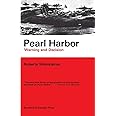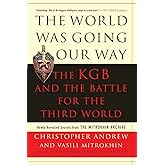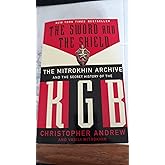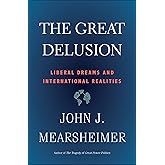
Enjoy fast, free delivery, exclusive deals, and award-winning movies & TV shows with Prime
Try Prime
and start saving today with fast, free delivery
Amazon Prime includes:
Fast, FREE Delivery is available to Prime members. To join, select "Try Amazon Prime and start saving today with Fast, FREE Delivery" below the Add to Cart button.
Amazon Prime members enjoy:- Cardmembers earn 5% Back at Amazon.com with a Prime Credit Card.
- Unlimited Free Two-Day Delivery
- Streaming of thousands of movies and TV shows with limited ads on Prime Video.
- A Kindle book to borrow for free each month - with no due dates
- Listen to over 2 million songs and hundreds of playlists
- Unlimited photo storage with anywhere access
Important: Your credit card will NOT be charged when you start your free trial or if you cancel during the trial period. If you're happy with Amazon Prime, do nothing. At the end of the free trial, your membership will automatically upgrade to a monthly membership.
Buy new:
$39.83$39.83
Ships from: Amazon Sold by: TimelessGreen
Save with Used - Good
$23.00$23.00
Ships from: Amazon Sold by: yjdbooks

Download the free Kindle app and start reading Kindle books instantly on your smartphone, tablet, or computer - no Kindle device required.
Read instantly on your browser with Kindle for Web.
Using your mobile phone camera - scan the code below and download the Kindle app.

OK
 Audible sample Sample
Audible sample Sample 


The Secret World: A History of Intelligence (Henry L. Stimson Lectures) Hardcover – September 4, 2018
There is a newer edition of this item:
Purchase options and add-ons
The history of espionage is far older than any of today’s intelligence agencies, yet the long history of intelligence operations has been largely forgotten. The codebreakers at Bletchley Park, the most successful World War II intelligence agency, were completely unaware that their predecessors in earlier moments of national crisis had broken the codes of Napoleon during the Napoleonic wars and those of Spain before the Spanish Armada.
Those who do not understand past mistakes are likely to repeat them. Intelligence is a prime example. At the outbreak of World War I, the grasp of intelligence shown by U.S. President Woodrow Wilson and British Prime Minister Herbert Asquith was not in the same class as that of George Washington during the Revolutionary War and leading eighteenth-century British statesmen.
In this book, the first global history of espionage ever written, distinguished historian Christopher Andrew recovers much of the lost intelligence history of the past three millennia—and shows us its relevance.
- Print length960 pages
- LanguageEnglish
- PublisherYale University Press
- Publication dateSeptember 4, 2018
- Dimensions9.4 x 6.5 x 2.4 inches
- ISBN-100300238444
- ISBN-13978-0300238440
The Amazon Book Review
Book recommendations, author interviews, editors' picks, and more. Read it now
Frequently bought together

Similar items that may deliver to you quickly
Editorial Reviews
Review
“For anyone with a taste for wide-ranging and shrewdly gossipy history—or, for that matter, for anyone with a taste for spy stories—Andrew’s is one of the most entertaining books of the past few years.”—Adam Gopnik, New Yorker
“Perhaps the most comprehensive narrative of intelligence compiled: the author's breadth and depth of knowledge are unrivalled.”—Max Hastings, The Sunday Times (London)
“To write a world history of intelligence, from the dawn of recorded history to the present day, is a daunting task. To make such a work accurate, comprehensive, digestible and startling, and all in a single volume, is a stellar achievement. But that is what Christopher Andrew has done in The Secret World.”—Edward Lucas, The Times (London)
“The Secret World is a work of magisterial breadth.”—Amy Zegart, American Interest
“This scholarly but readable history unlocks a portfolio of secrets—supersecrets, even. . . . Failures of intelligence . . . figure as much as successes in Andrew’s spry account. Fans of Fleming and Furst will delight in this skillfully related true-fact side of the story.”—Kirkus Reviews
“Both brilliant in its sweep and near-miraculous in the detail and confident judgments provided on two and a half millennia of spying. . . . A crowning triumph of one of the most adventurous scholars of the security world.”—Financial Times
“The Secret World is a magisterial book. It is designed for the lay reader as much as for the expert; the scale, breadth, and depth of the work confirm Christopher Andrew’s position as the great Yoda of intelligence studies in the UK.”—Michael S. Goodman, Literary Review
“The first global history of intelligence, remarkable for its scope and delightful for its unpredictable comparisons. . . . Given that intelligence is partly about prediction, Andrew argues that the history of intelligence is one of the most powerful tools that modern spies can deploy. Accordingly, there are important lessons for spymasters everywhere in this breath-taking and brilliant book. . . . A stunning secret archaeology of a subject that [Andrew] himself helped to create.”—Richard J. Aldrich, Times Literary Supplement
“A study of unprecedented scope and depth, [covering] spying around the world, and from biblical times to today.”—T. A. Frail, “Smithsonian VIP” Newsletter
“Impressive. . . . Andrew, eminent historian of intelligence services, gifts us with his lifetime of knowledge. . . . This book fills a great need and should interest any serious student of international affairs.”—Michael J. Art, The University Bookman
“A definitive account. . . . No other contemporary writer matches Andrew’s record of bringing the shadowy world of intelligence into the light.”—J. R. Dunn, The Federalist
“It just may convince you that the West’s vaunted intelligence agencies would have been more successful if they’d studied the past, and that our need for capable spy agencies is greater today than ever.”—The Week
“Andrew, eminent historian of intelligence services, gifts us with his lifetime of knowledge in the field. This book fills a great need and should interest any serious student of international affairs.”—Michael J. Ard, Supporting Statecraft
"Some contend that intelligence is the second oldest profession, and Andrew (Cambridge) agrees. To emphasize the point, he has provided in his new work a pivotal study concerning the history of intelligence that will stand the test of time."—C. C. Lovett, Choice
"The Secret World provides an indispensable basis for recognizing intelligence as something far more than even aficionados of spy literature could imagine."—Charles Hill, Claremont Review of Books
"Masterful and illuminating. . . . A masterpiece of concision, more than three thousand years of espionage and intelligence gathering covered within a single volume. . . . I am confident that it will achieve well-deserved status as a classic."—Aram Bakshian, Jr., The National Interest
“A truly magisterial tome, . . . a crowning achievement for Christopher Andrew, former official historian MI5 and leading Cambridge academic, whose life has been primarily devoted to the study of intelligence and espionage in the 20th century.”—Neil Kent, The RUSE Journal
“A truly magisterial work . . . [and] a must-read for any person with a serious interest in intelligence. . . . His evidence . . . is rich with anecdotes and opinions of world leaders who relied on — or ignored — intelligence as a tool of office. . . . An outstanding work. Ten cloaks, ten daggers.”—Joseph C. Goulden, Washington Times
Winner, 2018 Airey Neave Book Prize
“In this extraordinarily ambitious and monumental work, Christopher Andrew brings an enormous amount of detail together in one place so patterns can begin to emerge and readers can appreciate connections and dissimilarities. No other book has come close to what Andrew has done here.”—Harvey Klehr, Andrew W. Mellon Professor of Politics and History Emeritus, Emory University
About the Author
Product details
- Publisher : Yale University Press; First Edition (September 4, 2018)
- Language : English
- Hardcover : 960 pages
- ISBN-10 : 0300238444
- ISBN-13 : 978-0300238440
- Item Weight : 3.44 pounds
- Dimensions : 9.4 x 6.5 x 2.4 inches
- Best Sellers Rank: #868,683 in Books (See Top 100 in Books)
- #1,125 in Political Intelligence
- #1,698 in Military Strategy History (Books)
- #22,758 in World History (Books)
- Customer Reviews:
About the author

Christopher Andrew is Professor of Modern and Contemporary History and Chair of the Faculty of History at Cambridge University.
Customer reviews
Customer Reviews, including Product Star Ratings help customers to learn more about the product and decide whether it is the right product for them.
To calculate the overall star rating and percentage breakdown by star, we don’t use a simple average. Instead, our system considers things like how recent a review is and if the reviewer bought the item on Amazon. It also analyzed reviews to verify trustworthiness.
Learn more how customers reviews work on Amazon-
Top reviews
Top reviews from the United States
There was a problem filtering reviews right now. Please try again later.
Those comments should not detract from the overall excellence of this book. Just illustrating with numerous examples that there are a large number of steps between the collection of intelligence and putting the information to good use makes the book worthwhile. As Andrew's historical review shows, time after time, national leaders who have a preconceived notion of what they want intelligence to find are especially likely to ignore any information to the contrary. When they do, the outcome is often disastrous.
The chapter on Muhammad and the rise of Islamic intelligence is a rare treat, compelling reflections on the fact that the Muslim adversary, Israel, today has one of the most sophisticated and effective intelligence, and yet, Muhammad began the Muslim intelligence about 620 BCE. Andrew’s account of Elizabeth I and her super spy-in-chief, Sir Walsingham has intrigue and excitement, and the story included plots of assassination, not by the Pope, but by Mary Stuart’s Catholic followers.
Andrew covers espionage and intelligence in Britain, France, and America in the formative years; and in the case of France, from the ‘Revolution’ to Napoleon and beyond. After a detailed account of intelligence and counter-intelligence in Europe before the First World War, he continues with the most exciting parts of the book – espionage in the two World Wars, and the Cold War that followed. In his concluding chapter, Andrew shows from 21st century events including the interrogation of Saddam Hussein, Snowden, and Wikileaks, that intelligence is crucial and equally, that we must understand how intelligence gathering has changed in the age of digital technology.
One glaring shortcoming of this book, as has been pointed out by another reviewer, is that there is the conspicuous absence of intelligence from and against the Communist countries, Russia and China, in particular. The Arab-Israeli wars would have yielded much information and lessons in intelligence, as would the Vietnam War, and the Iraqi wars. Perhaps Andrew has a volume II in mind?
I think I can sum up the basics by saying that there will always be someone whom can profit by knowing and sharing
State secrets and an intelligence service must be aware and constantly alert.
Top reviews from other countries
Reviewed in India on April 17, 2024



At the time where Roman generals relied on oracles to make strategic decisions, the Chinese general Sun Tzu wrote “The art of war” theorizing the use of secret information and spies for gaining advantage and making decisions in war. Julius Caesar, the most successful of Roman generals, relied on spies to get information on its enemies and used ciphers to ensure the secrecy of his messages.
One of the roles of intelligence is to unmask the enemies of the state. It developed in the Christian countries of Europe, where the Inquisition was created to unmask the heretics and obtain confessions with methods that were to later inspire the NKVD and the Gestapo.
But the real scientific bases of intelligence were established, during the Abbasid dynasty in Baghdad, by mathematician and philosopher Al-Kindi who established the mathematical bases of cryptanalysis, the deciphering of coded messages.
From there on, intelligence would rely on information received from spies (human intelligence) and information extracted from stolen coded messages (signal intelligence). Following the reformation, intelligence was developed rapidly in England and France, to be used in the religious wars. The theoretical grounds of modern intelligence were established during that period. Walsingham, prime minister of Elisabeth I, relied very much on his talented code breakers, to gain information and defeat the invasion of the Spanish Armada. Walsingham, was not adverse to fabricating intelligence when needed to achieve his objectives, for example, the death sentence against Mary Stuart. Many would later follow his example. Leading Cambridge mathematicians played a decisive role in providing intelligence during the long British civil wars. It was a period that saw many theoretical developments, but deciphering remained an art as much as a science. In France, Cardinal Richelieu saw to the development and use of intelligence to help reduce the last protestant and English strongholds in France. Richelieu also saw to the development of the “cabinet noir” to systematically spy on the citizens and unmask enemies of the state. All the other European countries would follow his example.
Interestingly, after the defeat of the Spanish armada, the Royal Navy had an abysmal record on using intelligence all the way to the end of WWI. Informed by spies of French shipments to the Americans during the war of independence, they failed to intercept one single French ship. Nelson whose fleet was stationed in Naples did not receive news of Napoleon’s sailing to Egypt until it was too late to intercept the French expedition. He later destroyed the French Fleet anyway. The indecisive result of the battle of Jutland was due to a collection of errors by RN’s intelligence who advised Admiral Jellicoe that the German fleet had not left port when they already had, and then failed to advise him on the route followed by the retreating Germans.
The development in radio and cable communications together with theoretical developments in deciphering provided many new opportunities for intelligence collection in the XX century. Remained the question of how to use it. Many anecdotes illustrate the failure of political and military leaders to use rationally the intelligence that they receive. The intelligence community must share the blame as it often feeds only to political leaders the information that their want to hear. The case of Stalin’s refusal to listen to warnings from many agents of the impending German attack is well known as is the failure of US military to take precautions before Pearl Harbor. US intelligence read the Japanese diplomatic messages and knew that Japan was readying for war and that their navy was at sea ready to strike but expected (hoped?) the attack to be directed only on Singapore and the Dutch West Indies. During WWII, German intelligence was a total failure: they only and repeatedly swallowed British disinformation, hook, sinker, and line.
Intelligence and counter-intelligence, as well as covert actions, played a crucial role in the cold war. The NKVD, later KGB, often got the upper hand because they had deeply penetrated the West’s intelligence networks. The KGB was ruthless, never forgetting or forgiving an agent who had betrayed, but never forgetting or abandoning their people, and always bringing them back home for comfortable (by Soviet standards) retirement.
The main development during WWII had been the success of Bletchley Park’s team in breaking the German Enigma code thanks to the work of mathematicians and mostly the introduction of the computer in cryptanalysis. With the ever increasing computer power, given sufficient time there is no code that cannot be broken. Cryptanalysis has changed forever, but the interpretation of intelligence has not changed much: it remains an art at which very few people are good!
Christopher Andrew’s four main themes are:
- The neglect of the role of espionage, counter-intelligence and especially signals intelligence by historians and international relations academics;
- The short-term non-historical outlook of decision-makers and analysts;
- The reluctance of intelligence advisors in oppressive regimes to ‘speak truth to power; and
- The focus of intelligence agencies serving such regimes on perceived political challenges – at home and abroad - to the regime’s survival rather than threats from other states.
He demonstrates these themes through his survey of intelligence from Moses to today’s international terrorism, dealing with Tudor England, the Congress of Vienna, the Fashoda Incident, the Dreyfus Affair and much else on the way. Despite the length of the book, this inevitably leads to a helicopter view of some historical intelligence episodes and the need to spend time explaining the international politics before drilling down into the role of intelligence in it. Also, the balance is perhaps weighted a little too far towards the USA, the USSR/Russia and Britain at the expense of other ‘players’.
These are minor quibbles about a book that is not only informative and - with the extensive notes - a valuable reference, but also a pleasure to read. And Andrew gives plenty of mentions of the role of his University of Cambridge in the history of intelligence, plus a few to that of Oxford.













